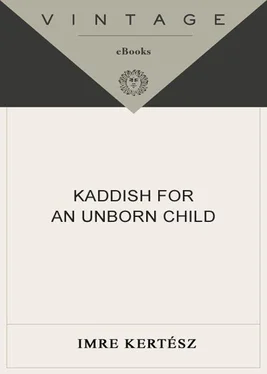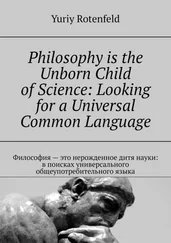my existence viewed as the potentiality of your being —now, in the light of that series of recognitions and in the shadow of the onward march of time, was altered, once and for all, in the following manner:
your non-existence viewed as the necessary and radical liquidation of my own existence. Because this is the only way in which everything that happened, everything that I did and that was done to me, has any meaning, only this way does my meaningless life have any meaning, including my continuing what I started, to live and write, it doesn’t matter which, both together, for my ballpoint pen is my spade, and if I look ahead, it is solely to look backwards, if I stare at a sheet of paper, I see solely into the past:
and she traversed a greenish-blue carpet as if making her way on the sea since she wished to speak with me because she knew that I am who I am, B., writer and literary translator, a “piece” of whose she had read that she
absolutely had to talk to me about, she said, and talk about it we did until we talked ourselves into bed — God help us! — and we talked afterwards, and meanwhile too, non-stop. Yes, and I recall she started by asking if I was serious about what I had said in the heat of the discussion that had taken place beforehand; but I don’t know what I said, I said, as I really did not know, I had said so many things, and I had been just on the point of departing unnoticed (“à l’anglaise,” as they say) because I had been irritated and bored by the foregoing discussion, during which I had said what was said, driven by my habitual and loathsome compulsion to speak, a compulsion that assails me chiefly at times when I would prefer to stay silent, on which occasions the compulsion is nothing other than a vocal silence, a verbalized silence, if I may be allowed to overstate the modest paradox: so remind me, I asked, and she, in a choking, husky voice, sketched out a few purchase points, almost severely, aggressively and altogether with a sense of dark, tense excitement — a sexual charge transposed or sublimated into the intellectual realm, or purely and simply disguised by the intellectual realm, I mused lazily and with that unerring sense of certainty with which one is regularly in error, with that resolute blindness whereby one never recognizes continuity in the momentary, consistency in the accidental or a collision in an encounter from which at least one of the parties is bound to emerge as a limping wreck, a sexual charge, I mused naturally and shamelessly, in the way that we all transpose or sublimate or purely and simply disguise our own sexual charge. Yes, and especially now that in my dark, unfathomable night I see rather than hear that social discourse, I see the gloomy faces around me, but only as so many theatrical masks bearing their various roles, those of the weeper and the joker, the wolf and the lamb, the monkey, the bear, the crocodile, and this whole menagerie was murmuring quietly in some huge ultimate swamp where the protagonists, as in one of Aesop’s horror fables, were still drawing the final lesson, and someone came up with the melancholy idea that everyone should say
where he had been , at which the names began to drop with a weary spattering, like rain from a passing cloud which has long ago spent its force: Mauthausen, the Don Bend, Recsk, Siberia, the Transit Centre, Ravensbrück, Fö Street, 60 Andrássy Avenue, the internal resettlement villages, the post-56 jails, Buchenwald, Kistarcsa… by now I was dreading it would be my turn, but fortunately I was preempted: “Auschwitz,” said somebody in the modest but self-assured tones of a winner, and the whole gathering nodded furiously: “Untrumpable,” as the host himself admitted, half enviously, half grudgingly, and yet, when all is said and done, with a wry smile of acknowledgment. Later on the title of a modish book of that period was brought up, a book with a sentence that was modish then, indeed is so to this day and in all likelihood always will be, that the author, after proper but, of course, quite futile clearing of the throat, in a voice still hoarse with emotion, declares “There is no explanation for Auschwitz”—just that, tersely, intensely, swallowing quietly, and I remember how, to my amazement, this gathering of, after all, for the most part hardheaded people accepted, analyzed and debated this simplistic statement, scrutinizing it this way and that, with eyes blinking slyly or hesitantly or uncomprehendingly from behind their masks, as if this declaration to nip all declarations in the bud was actually declaring something, though you do not have to be a Wittgenstein to notice that in point of linguistic logic alone it is flawed and reflects at most certain desires, a false or frankly infantile morality and sundry suppressed complexes but apart from that has no declarative value whatsoever. I believe I actually said so too, after which I just talked and talked, unstoppably, to the verge of logorrhea, taking note from time to time of a woman’s gaze that was fixed on me as if seeking to tap a source deep inside me; and, in the thick of my compulsive need to speak, what sprang fleetingly and quite possibly faultily, reflecting at most certain desires and sundry suppressed complexes — as I say, what sprang to mind is that it had been her, the woman who later on became my wife but before that my lover, whom I got to know only after that conversation, when, tired, embarrassed and forgetting all, I had been just on the point of departing unnoticed (“à l’anglaise,” as they say) and she traversed a greenish-blue carpet as if she were making her way on the sea. I don’t even recall what I said, though obviously I gave vent to my opinion, which obviously cannot have changed much since then, if indeed it has changed at all, which I find very hard to believe, except nowadays I am not much given to venting my opinions, whence perhaps my vague doubts regarding my opinion; but then to what end, and to whom, would I give vent to my opinion, and above all where, since I don’t lodge permanently in holiday homes in some mediocre mid-Hungarian hill range in order to cope with the nonpassing of time by giving vent to opinions in the company of Dr. Obláth and high intellects of his ilk — not at all, I reside permanently, or near-permanently, in a one-and-a-half room doodah, there, I nearly said it: apartment, God forgive me — my apartment — my now sun-baked, now wind-buffeted (and sometimes both together) lair on the fourteenth floor of a tower block, looking up from time to time into the brilliant air or at the clouds in which I am digging my grave with my ballpoint pen, diligently, like a forced laborer who is whistled up every day to drive the spade deeper, to play death on the violin with a darker, sweeter tone; here I would be able to vent my opinion, at best, to the thrumming water pipes, the rattling heating pipes and the howling neighbors, here in this tower block in the heart of the Józsefváros district of Budapest, or rather not its heart but its entrails, a block that is so conspicuous, so startling, like an oversized artificial limb, in this ground-hugging neighborhood, but from my window I can at least peek over the (what a surprise!) still extant old fence, and see the pitiful secret of a paltry garden which was a constant source of excitement in my childhood but now excites me not at all, indeed distinctly bores me, as indeed does the thought that, due to certain circumstances (my divorce, my predilection for the worst yet not necessarily the simplest solutions, and then too the fact that the money doesn’t exactly roll in), so anyway due to certain circumstances I have ended up back here, in the place where I spent a number of miserable childhood summer and winter vacations, where I gained a number of miserable childhood experiences, so the thought that I am again living here, as long as I still have to live, fourteen floors above my childhood, and therefore inevitably, and now purely for my annoyance, sometimes assails me in the form of totally superfluous memories of my childhood, for surely these memories long ago fulfilled the function that they had to fulfill, their stealthy rat work, eroding everything, gnawing away at everything, they could safely have left me in peace by now. But to get back to… what was it?… to my opinion — God help us! — I most probably must have said that this statement, which is to say the statement “There is no explanation for Auschwitz,” is faulty in purely formal terms, since for something that
Читать дальше












